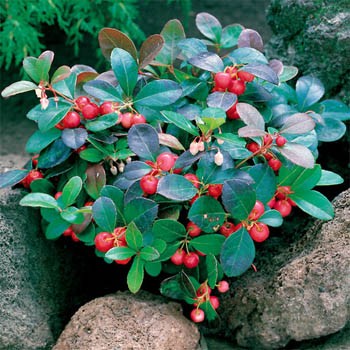Wintergreen
Wintergreen is an herb. Wintergreen oil is made by steam processing of warmed, water-soaked wintergreen leaves. The leaves and oil are used to make medicine.
Contents
Uses
- Wintergreen leaf is used for painful conditions including headache, nerve pain (particularly sciatica), arthritis, ovarian pain, and menstrual cramps. It is also used for digestion problems including stomachache and gas (flatulence); lung conditions including asthma and pleurisy; pain and swelling (inflammation); fever; and kidney problems.
- Some people use small doses of wintergreen oil to increase stomach juices and improve digestion.
- Wintergreen leaf is sometimes applied directly to the skin as a wash for achy joints (rheumatism), sore muscles, and lower back pain.
- Wintergreen oil is applied to the skin as a “counterirritant” to relieve muscle pain. Counterirritants work by causing irritation that reduces pain and swelling in the underlying tissue. Wintergreen oil is also used to kill germs on the skin.
- In manufacturing, wintergreen is used as a flavoring agent in food, candies, teas, and in pharmaceutical products.
Benefits
- Wintergreen leaf contains an aspirin-like chemical that might reduce pain, swelling, and fever.
Side Effects
- Wintergreen is safe in the amounts found in foods, and seems safe for most adults when used as a medicine.
- The oil is UNSAFE to take by mouth. Taking wintergreen oil or large amounts of wintergreen leaf can cause ringing in the ears, nausea, vomiting, diarrhea, headache, stomach pain, and confusion.
- When applied directly to the skin, wintergreen oil can cause skin irritation.
- Children: Wintergreen leaf and oil can be poisonous for children. Taking 4-10 mL of wintergreen oil by mouth can be deadly. Don’t even use wintergreen oil on the skin of children less than 2 years old.
- Pregnancy and breast-feeding: Wintergreen is safe in amounts found in food, but there’s not enough information to know if it’s safe in the larger amounts that are used as medicine. Don’t take it by mouth or put it on your skin, if you are pregnant. If you are breast-feeding, don’t take wintergreen by mouth or put it on your skin. Wintergreen products might be toxic to nursing infants.
- Stomach and intestinal inflammation: Taking wintergreen by mouth might make these conditions worse.
- Salicylate or aspirinallergy, asthma, or nasal polyps: Wintergreen might cause an allergic reaction in people who are allergic to aspirin or other salicylate compounds, or have asthma or nasal polyps. Use wintergreen with caution if you have one of these conditions.
Interactions
Major Interaction Do not take this combination
- ‘Warfarin (Coumadin) interacts with WINTERGREE: Warfarin (Coumadin) is used to slow blood clotting. Wintergreen oil can also slow blood clotting. Taking wintergreen oil along with warfarin (Coumadin) can increase the chances of bruising and bleeding. Be sure to have your blood checked regularly. The dose of your warfarin (Coumadin) might need to be changed.
Moderate Interaction Be cautious with this combination
- Aspirin interacts with WINTERGREEN: Wintergreen oil contains a chemical similar to aspirin. Using large amounts of wintergreen oil on your skin and taking aspirin at the same time might increase the risk of side effects. Do not use large amounts of wintergreen oil on your skin and take aspirin at the same time.
Other Names
Boxberry, Canada Tea, Checkerberry, Deerberry, Essence de Gaulthérie, Gaulteria, Gaultheria Oil, Gaultheria procumbens, Gaulthérie Couchée, Ground Berry, Hilberry, Huile de Thé des Bois, Mountain Tea, Oil of Wintergreen, Partridge Berry, Petit Thé, Petit Thé des Bois, Spiceberry, Teaberry, Thé de Montagne, Thé de Terre-Neuve, Thé du Canada, Thé Rouge, Thé des Bois, Wax Cluster.
References
Source: WebMD, “Wintergreen”, www.webmd.com/vitamins-supplements/

